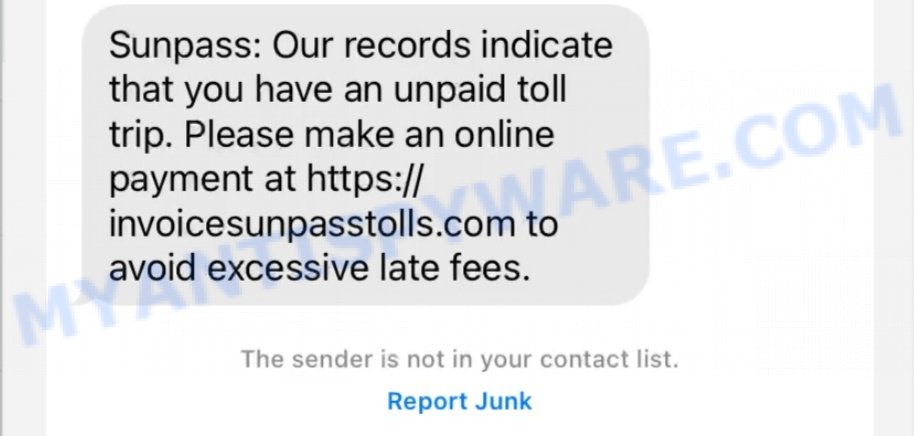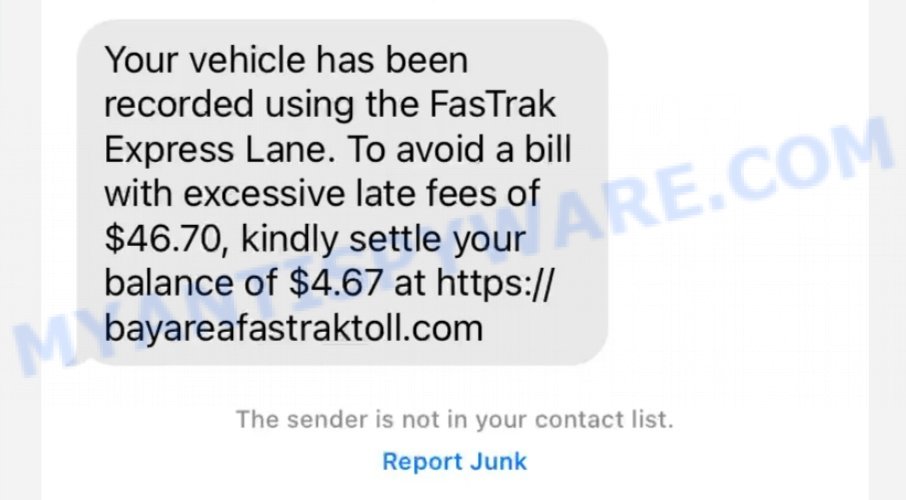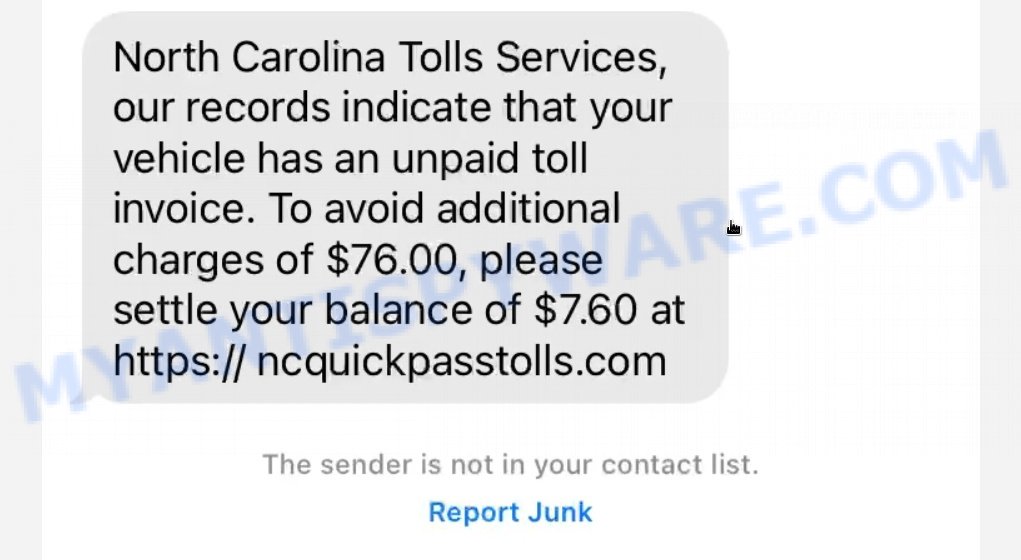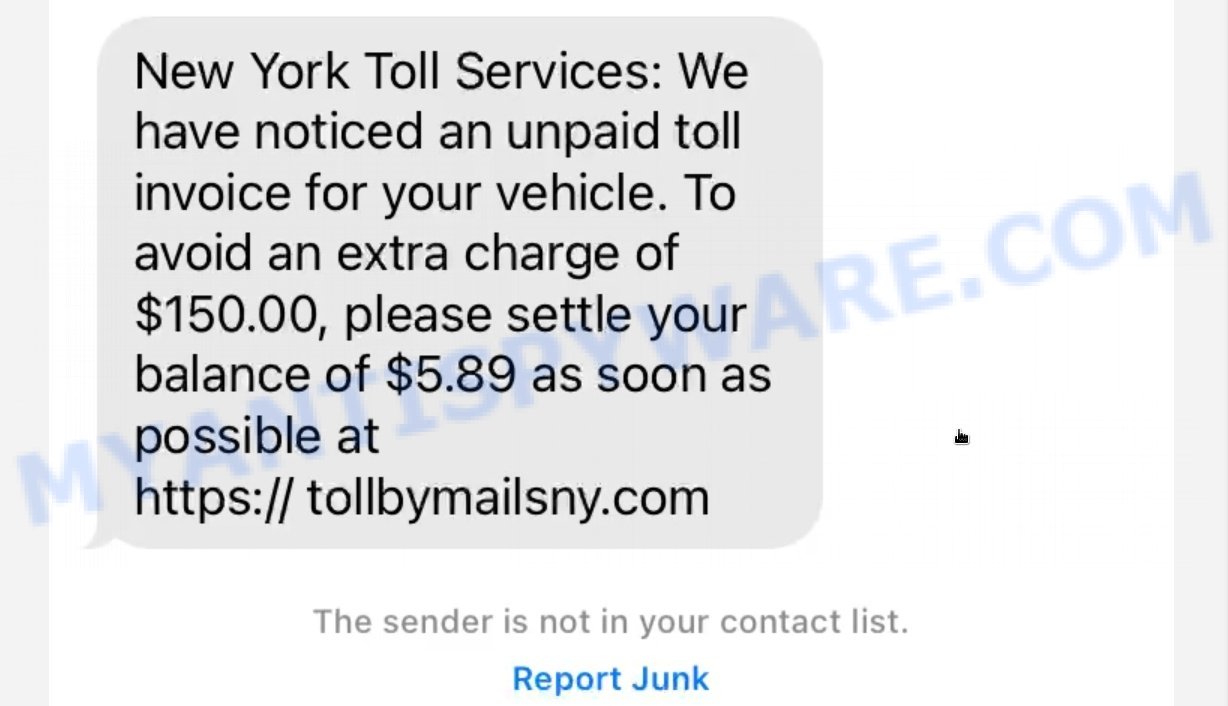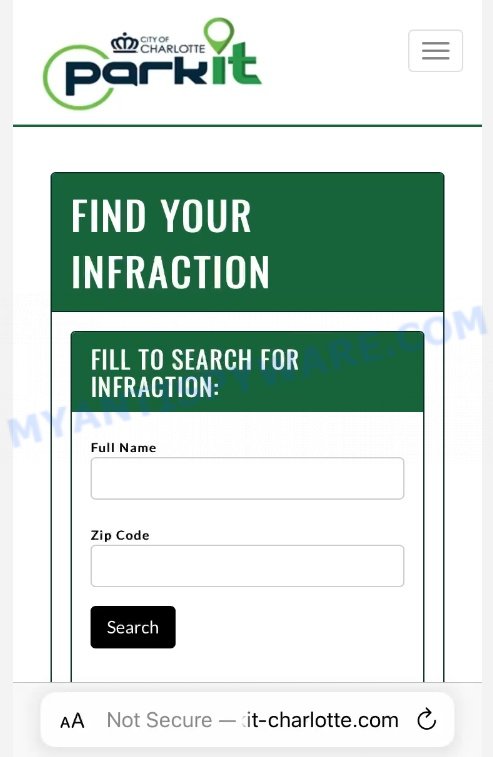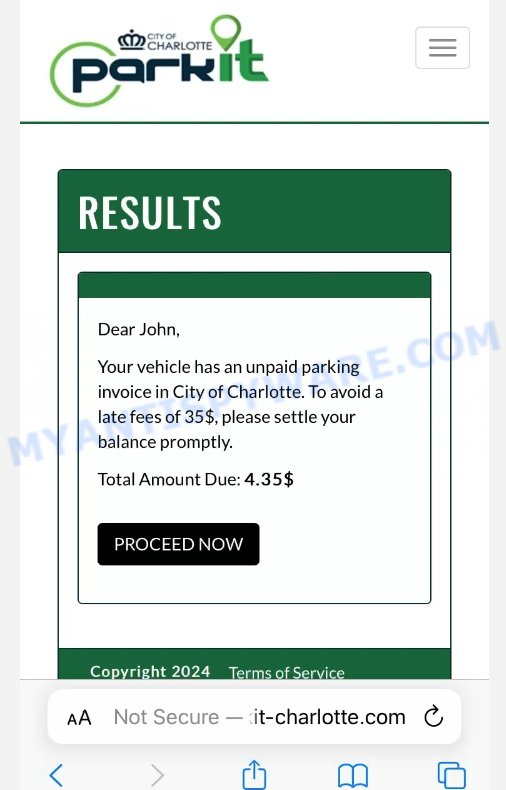Have you received a text message claiming to be from the City of Charlotte about an unpaid parking invoice of $4.35, urging you to settle promptly to avoid a late fee of $35, with a link leading to websites like parkit-charlotte.com or parkit-nc.com?
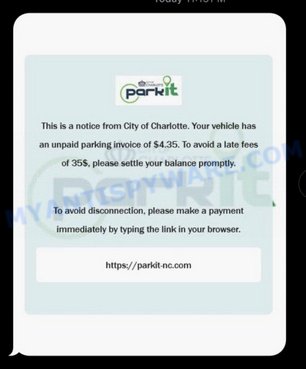
Question: Is this message legitimate, and should you pay the invoice through the provided link?
Investigation Findings: The message links to scam websites impersonating legitimate entities to trick you into providing financial information. The domain information reveals that these sites are not affiliated with any official parking authority and are designed to scam unsuspecting individuals.
Answer: The ParkIt Charlotte Parking Invoice text is a fraudulent attempt to obtain your personal and financial details. 💡 To protect yourself from scams like this one, never click on suspicious links or provide personal information through unknown websites. Additionally, if you receive messages claiming to be from local authorities, contact them directly through official channels to verify the claim.
Table of Contents
- 🚨 Is the ParkIt Charlotte Parking Invoice Text Message a Scam?
- 🕵️♀️ How the ParkIt Charlotte Parking Invoice scam works
- 🛡️ Steps to Take if You Receive a Toll Payment Scam Text
- 📌 How to Report ParkIt Charlotte Parking Invoice Scam Texts
- 😱 What to Do If You Clicked on ParkIt Charlotte Parking Invoice Scam Link
🚨 Is the ParkIt Charlotte Parking Invoice Text Message a Scam?
Yes, the text message stating your vehicle has an unpaid parking invoice and urging you to pay $4.35 at a suspicious website (parkdt-nc.com) to avoid additional fees of $355 is a SCAM! 🚫 If you’ve received such a text, exercise extreme caution. The claims are fabricated and designed to instill urgency, misleading you into submitting personal and payment information on a phishing site.
Background on the ParkIt Charlotte Parking Invoice Scam:
This scam, often referred to as “smishing” (a blend of SMS and phishing), involves fraudsters impersonating legitimate parking agencies such as those from Charlotte. The scammers send text messages that demand payment for unpaid parking invoices, which they claim can only be resolved through the links provided in the message.
However, legitimate parking agencies clearly state that they never request parking payments or handle parking violations via text messages. Official communications about parking payments should direct users to their respective official websites and not through any unsolicited links sent via SMS.
The alarming spread of these scams has prompted various government and consumer protection agencies, including the FBI and the Better Business Bureau, to issue warnings. These agencies have reported that the scams have been reported in numerous states, with similar tactics used to exploit residents.
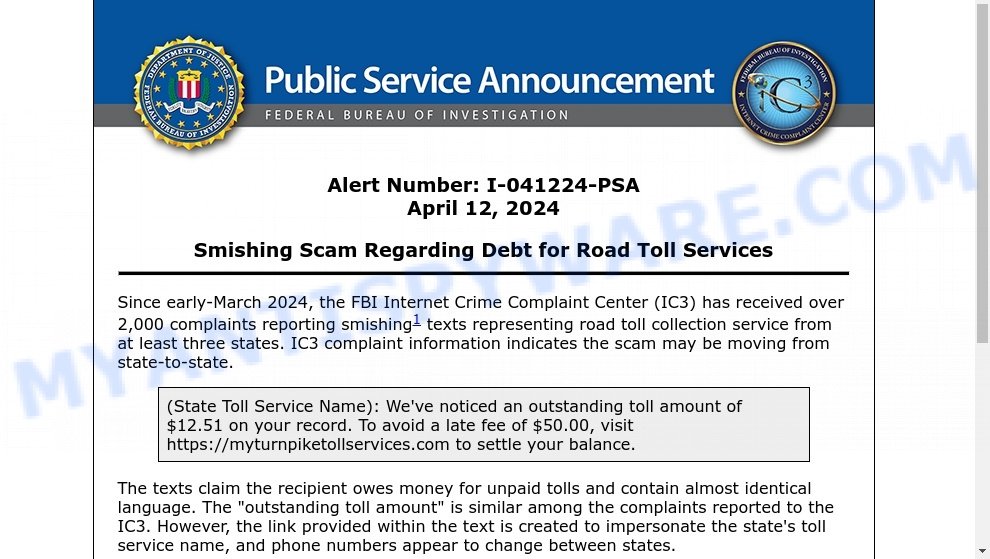
The deceptive messages typically claim there is an “unpaid parking invoice” or “unpaid toll invoice” and direct victims to a phishing website that resembles the official city parking service’s site or a state toll service’s site. However, the real purpose of these websites is to steal personal and financial information.
🚩 Red Flags to Watch Out For:
To protect yourself, be aware of these warning signs of the scam: 🔍🛡️
- 📧 Unsolicited Requests: Unexpected texts that claim you owe money for parking, especially from sources you do not recognize.
- 🔗 Suspicious Links: The scam includes links to sites that are designed to look like official parking payment sites but are fraudulent, such as the example given with parkdt-nc.com.
- ⏳ Urgency and Imposed Deadlines: These messages impose a tight deadline to pressure you into acting hastily, using fear of hefty late fees to coerce you into paying immediately.
- 💳 Demands for Personal Information: Be skeptical of any request to enter sensitive information on websites linked from these texts, as legitimate agencies manage such issues through secure, official channels.
- 👤 Anonymity of the Sender: Scammers might use untraceable numbers or obscure sender IDs, making it difficult to verify the source.
- 🔄 No Evidence of Debt: Legitimate parking fees would normally be documented formally or provide a method for dispute and verification, not merely mentioned in a text.
🕵️♂️ How the ParkIt Charlotte Parking Invoice Text Scam Works
The ParkIt Charlotte Parking Invoice scam is a phishing scheme designed to steal your personal and financial information by convincing you that you have an unpaid parking invoice that needs to be settled immediately. Being aware of how this scam operates is crucial for your safety. 💡🔐
🚨 Exploiting Your Urgency
This scam begins with a text message falsely claiming your vehicle has an unpaid parking invoice in the City of Charlotte. It uses urgent language and threats of excessive late fees, pushing you to act quickly without questioning the legitimacy of the claim.
🔗 Suspicious Links and Instructions
The scam message includes a link to a fraudulent website that mimics official city parking services. The URL provided is designed to look convincing, thus tricking you into visiting the site.
🎭 Misleading Financial Demands
Upon accessing the fake site, you’ll find a demand for payment of a specific small amount (such as $4.35) to make the claim seem legitimate. The message urges quick payment to avoid a dramatically higher late fee.
📥 Capturing Your Payment Information
The deceptive site requests your credit card details to “settle” the supposed unpaid invoice. This direct approach is an effective way for scammers to gain access to your financial resources.
🔄 Creating a False Sense of Emergency
The scammers manufacture a sense of crisis, suggesting that immediate action is necessary to avoid late fees and potential vehicle disconnection or further penalties.
🕳️ Intimidation and Deception
The scheme manipulates you into thinking you’re addressing a genuine problem by submitting your payment information. It may also include warnings about potential legal consequences or rapidly accumulating fees to pressure you into acting swiftly.
By understanding these tactics, you can protect yourself from this and similar scams. Always verify any claims through official channels and never share personal or financial information on suspicious websites.
Steps to Take if You Receive a Parking Invoice Scam Text
Receiving a scam text claiming you owe a parking invoice can be alarming. However, there are straightforward actions you can take to safeguard yourself.

Action Guide Against Toll Payment Scam Texts:
Firstly, keep calm. The scam message wants to rush you into making a mistake by paying or providing personal information. Recognize it for what it is: a common fraud attempt.
Do not send any money. Paying the scammer won’t solve anything. It only puts you at risk of losing money and encourages the scammer to target you again.
Don’t reply. Interacting with the scammer in any way can reveal more about you and confirm that your phone number is active, inviting more fraudulent messages.
If the scam text mentions specific details, like a password or personal info, investigate its origin. Check if your data has been part of a leak by using sites like haveibeenpwned.com.
Next, update your passwords. Create strong, unique passwords for each of your accounts and activate two-factor authentication wherever possible for added security.
Check your device for safety. Run a scan with reliable security software to ensure your phone or computer hasn’t been compromised by malware.
Report the scam text. Inform authorities such as the FTC or your local cybercrime unit. Your report can help prevent future scams.
Lastly, inform your network. Sharing information about this scam with friends, family, and colleagues increases awareness, making it less likely for others to fall victim.
📌 How to Report ParkIt Charlotte Parking Invoice Scam Texts
If you receive a text message claiming you have an unpaid parking invoice and urging immediate payment to avoid high late fees, be cautious as it’s likely a scam. Reporting such texts is important for your safety and helps protect others. Here’s how you can easily report these scam texts:

🔍 Spot the Scam Text
Find the text message that seems like a scam.
👉 Use Your Phone to Report
Your phone lets you report a text as spam or scam. Press and hold the scam message to do this.
🚩 Pick the Report Option
Select the right option to report the message. This could be “Report Spam” or something similar.
📱 Tell Your Mobile Company
Send the scam text to 7726. This spells “SPAM”, and it lets your mobile company know about the scam.
🔗 Tell the Authorities
Some places let you report scam texts to the government or groups that protect consumers. Look online to find out where you can report in your area.
🛡️ What to Do Next
If you clicked on the link in the scam text, watch your accounts for any strange activity. Think about changing your passwords. You might also want to tell your bank or credit card company about the scam.
✔️ Finish Reporting
Make sure you follow all the steps your phone, mobile company, or local government asks you to complete the report.
Threat Summary
| Name | ParkIt Charlotte Parking Invoice Text Scam |
| Type | Phishing, smishing |
| Text Message Content | parkit This is a notice from City of Charlotte. Your vehicle has an unpaid parking invoice of $4.35. To avoid a lato fees of 355, please settle your balance promptly. ark To avoid disconnection, please make a payment immediately by typing the link in your browser. [scam website] Scam website content: |
| Phishing site | parkit-charlotte.com, parkit-nc.com |
| Fake Fee | Extra fees (implied) |
| Targeted Information | Full name, address, phone number, credit card details (number, CVV, expiration date) |
| Harm | Loss of money, identity theft risk |
| How It Spreads | Mass text messaging to random or targeted phone numbers |
| Scammer’s Methods | Creating urgency, pretending to be a legitimate toll payment service |
| Variations | Different amounts claimed, various phishing website URLs |
| Protection Tips | Don’t click on links in unsolicited texts; confirm any toll charges directly through official websites; use strong passwords; enable two-factor authentication for online accounts; educate yourself on phishing signs |
| What To Do If You Receive A Scam Text | Don’t use the link in the text; verify any claims through the official site; report the scam to your mobile carrier; monitor your financial statements regularly |
| Reporting Info | Report the text to your mobile carrier by forwarding it to 7726; inform local or national consumer protection agencies; share information about the scam to warn others |
😱 What to Do If You Clicked on ParkIt Charlotte Parking Invoice Scam Link
If you accidentally interacted with a text from the ParkIt Charlotte Parking Invoice scam, it’s crucial not to panic. Follow these steps to safeguard your personal and financial information effectively.

🔐 Immediate Password Change
Immediately change the passwords for any accounts that you fear may be compromised. This includes your financial accounts, email, and any other sensitive accounts, especially if you have used similar passwords.
👀 Monitor Financial and Credit Reports
Closely monitor your bank accounts and credit reports for any unusual activities. Scammers might use your personal information to commit identity theft or unauthorized transactions.
📞 Contact Your Financial Institutions
Get in touch with your bank and credit card companies. Inform them about the scam and any actions you may have taken after interacting with the message. They can offer specific advice to secure your accounts.
🔒 Enable Two-Factor Authentication
Activate two-factor authentication for your sensitive accounts. This adds an extra layer of security, safeguarding your accounts even if scammers have obtained some of your credentials.
🚫🔗 Inform Your Contacts
Warn your friends, family, and network about the scam. Advise them to be cautious of similar messages and not to trust unsolicited texts or links, especially those claiming to be from financial institutions.
📝 Document the Scam
Record evidence of the scam, such as screenshots of the message and any interactions you had. This documentation can be useful if you need to report the incident or for future reference in case of any disputes or investigations.
👮♀️ Report to Cybersecurity Authorities
Consider reporting the incident to local cybersecurity or law enforcement authorities. While online scams are common, reporting them can contribute to broader efforts to combat such malicious activities.
📘 Stay Informed and Educated
Regularly update yourself on the latest online scams. Staying informed helps you recognize and avoid falling victim to similar tactics in the future.
🎯 Conclusion
The ParkIt Charlotte Parking Invoice text message is a scam. The scammers behind this attempt use pressure tactics, sending messages that falsely claim you have an unpaid parking invoice. What is their goal? To deceive you into clicking on links that take you to phishing sites designed to steal your personal and financial information. Falling for this scam can result in the theft of your sensitive data, further scams targeting you, and potential financial losses.
It’s crucial to understand that legitimate notifications about parking invoices or financial matters generally come directly from the actual city authorities or recognized service providers, not through unsolicited texts with dubious links. If you receive an unexpected message regarding parking invoices or any financial issues, it’s essential to verify its authenticity by contacting the city’s official services directly or visiting their official website independently.
Avoid clicking on links in text messages, and inform your friends and family about these scams. Regularly updating your passwords and enabling additional security measures like two-factor authentication can significantly enhance your online security. 🛡️
